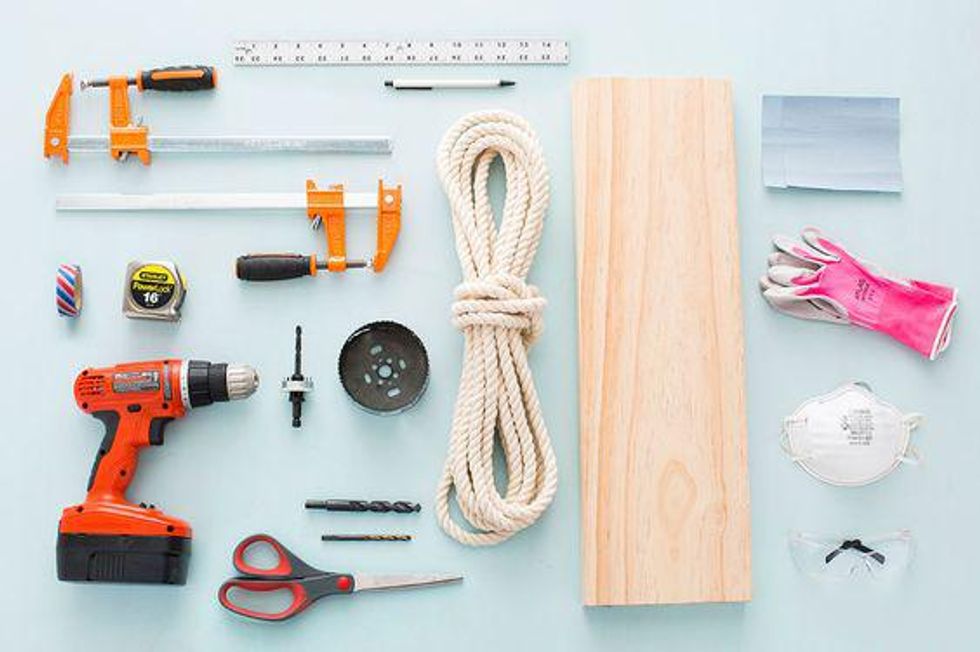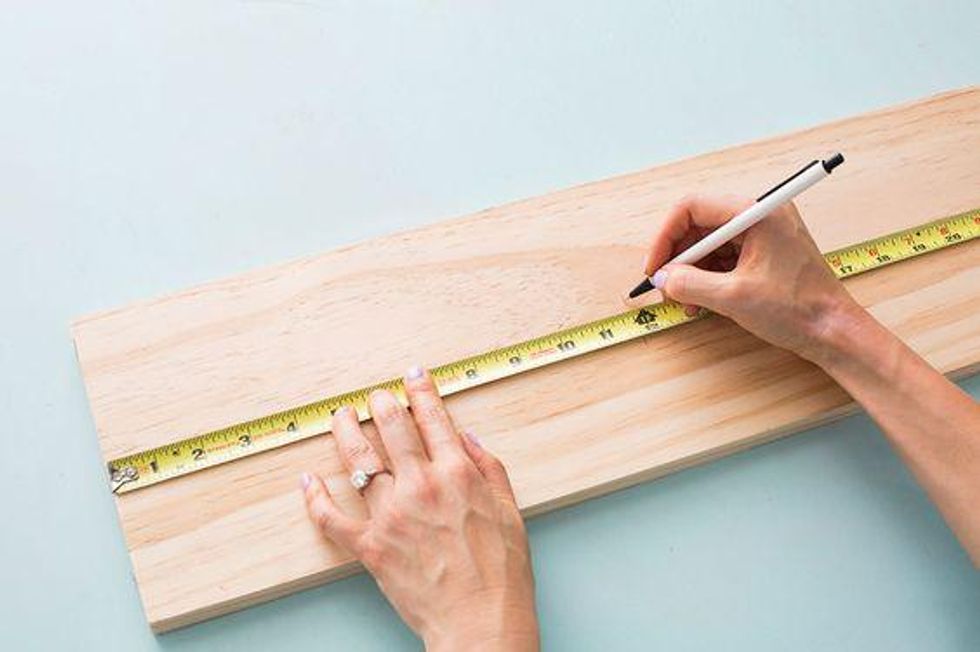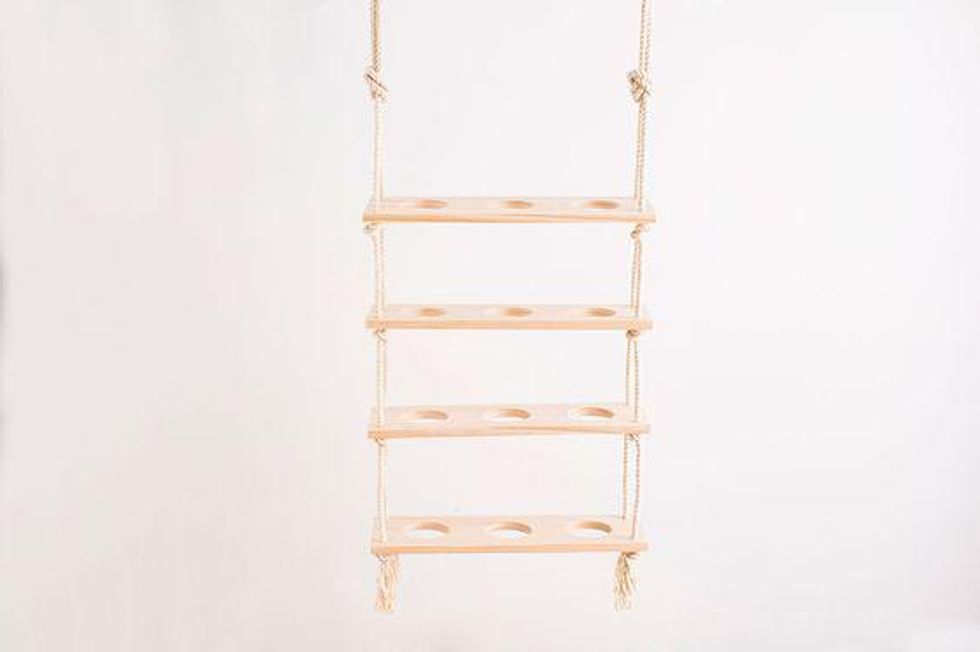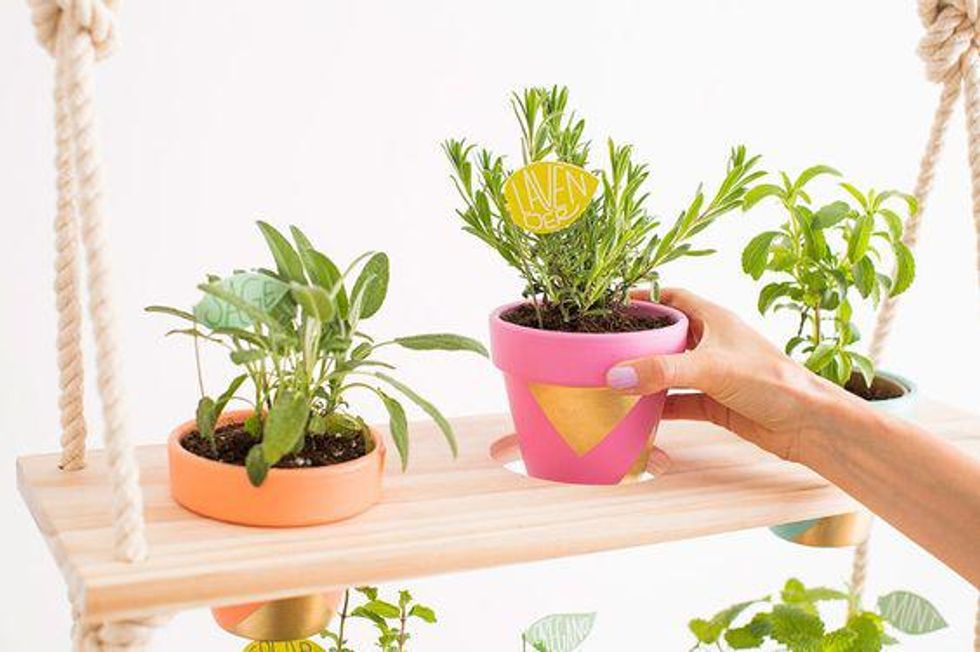
Roll up those sleeves, throw your hair in a knot and grab your power drill for an epic woodworking DIY! This four-tier vertical planter will jazz up your yard without taking up a ton of space. Fear not, city dwellers! All you need is pinewood, twisted rope and 12 new green friends to turn your tiny yard into a lush garden. Kick it up a notch and get festive with these bold and gold mini pots. Then throw in some rosemary, mint and lavender, and you've got yourself an herb garden fiesta — perfect for fresh cocktails all day every day.
What You Need

- 4 pieces of 23 x 7-inch pine board
- 4 pieces of 3/4-inch-thick twisted cotton rope (rope length is 9 feet)
Tools:
- power drill– hole saw
- hole saw arbor
- 2 12-inch bar clamps
- ½-inch drill bit (for rope holes)
- 15/64-inch drill bit (or similar size for pilot holes)
- sandpaper (fine to medium grain)
- washi tape
- scissors
- tape measure
- ruler
- pencil
- goggles
- gloves
- dust mask

- If you didn’t get your boards pre-cut at a hardware store like Lowe’s or Home Depot, then cut them using a hand saw or table saw so that each board is exactly 24 inches wide and 8 inches tall.
- Grab one of your boards, a pencil, and ruler. Then find the center of your board and mark an “X.” Measure your board so that each circle for the planter holes is four inches in diameter with three inches of space in between. Mark an “X” at the center of each circle. Then mark an “X” at the corners of each board.
Pro tip: start measuring from the center of the board out using a ruler. This will help keep your circles evenly spaced.

- Next, grab your cut boards and stack them on top of each other. Add one more scrap board at the bottom of the stack so you don’t drill a hole through your table. Use the clamps to keep your boards in place. Make sure your boards are tightly secured.
- Put on your dust mask, goggles, and gloves. Then, using the smaller 15/64 drill bit, drill pilot holes through all the “X” marks on your board. Make sure to drill all the way through all four of your boards :)
- Remove the smaller drill bit and replace it with the ½-inch drill bit. Then drill holes in the corners of your boards. Again, make sure you drill through all four of your boards.
- Attach your hole saw and hole saw arbor to your power drill. Make sure it’s on securely and nothing is loose. Set your drill at the highest torque setting — you need a lot of power for the next step!
- Align the center of the hole saw bit to one of the pilot holes for the circles. Use two hands to hold the drill steady. Make sure you have a strong grip and use both hands! Press the trigger while still floating directly above the wood. Then start cutting into the wood very slowly. Make a circular motion as you cut through the edges of the circle. Continue to cut through all four pieces of wood.
- Safety instructions: roll up your sleeves, tie your hair back and wear your goggles, gloves and dust mask. Handling a hole saw can be difficult if it’s your first time and can cause a whiplash effect on your arm while drilling into the wood. Hold on tight, keep the drill steady and move slowly.
- Sand down your boards until the wood is nice and smooth. Make sure to get the inside of the pot holes. Smooth out the corners of the board as well.

Feed your rope through the corner holes. Start with one board and feed all four ropes through each corner.

- Tie a loose single loop knot directly underneath each corner hole. These knots will keep the boards in place. Tie the knots with about nine inches of space between the knot and the board below. Then add in the next board.
- After you’ve added your last board, grab the two rope lines on one side and tie a single loop. Do the same on the other side. You should have enough slack to hang the ends on your ceiling. You can use a ceiling hook or wrap the ropes on a long wooden dowel or pipe.
- Now that your vertical planter is hanging, even out the space between each board by adjusting the knots below.

Get creative! Add bright colors and gold leafing to your terracotta pots. Follow the tutorial here.

Follow us on Pinterest for more DIY hacks!
Check out B + C classes and get creative!
0 Commentaires